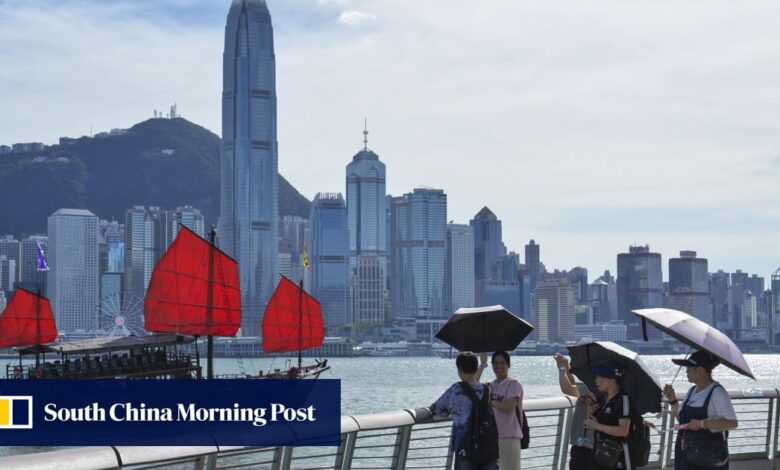Mainland Chinese companies eye Hong Kong as launch pad for overseas expansion, but some look beyond Western markets, trade body says

[ad_1]
Mainland Chinese companies have expressed a strong desire to use Hong Kong as a launch pad for overseas expansion, as some looked outside traditional markets such as the US and UK amid geopolitical tensions and economic uncertainties, a study has found.
The Hong Kong Trade Development Council published the survey on Tuesday after it interviewed 791 companies based in the Yangtze Delta region and the Greater Bay Area.
The bay area is the site of Beijing’s ambitious project to integrate Hong Kong, Macau and nine mainland cities into an economic powerhouse.
Hong Kong should look beyond online entertainment in embracing Web3: Paul Chan
Hong Kong should look beyond online entertainment in embracing Web3: Paul Chan
The study found more than 90 per cent of companies said they planned to increase their business activities abroad in next three years, and 62.1 per cent wanted to use Hong Kong-based professional services to help their expansion.
“When leaving your own country to expand into foreign markets, companies need a huge amount of international professional services to help them settle, including financial services and legal services,” Irina Fan Yuen-yee, the director of the council’s research body, said.
About a quarter of the respondents were part of the trading industry, while the construction, infrastructure and real estate sectors accounted for about 20.3 per cent of interviewees.

The results showed an increased demand for Hong Kong-based services compared with 2019, when 76 per cent of mainland companies said they wanted to expand abroad and only half wanted to use the city as a go-between.
This year’s figures showed that 37 per cent of businesses hoped to expand by investing in infrastructure and real estate and 28.8 per cent had considered increasing their logistics and shipment services.
Another 16.4 per cent said they aimed to increase product sales across more markets.
Wing Chu, head of the research body’s special project and business advisory section, said it made sense that logistics was a major focus for mainland companies.
“As China continues its industrial and economic integration with other players in the region, reaching them will be one of their major developmental directions,” Chu said.
Hong Kong leader promises focus on emerging economies to boost city economy
Hong Kong leader promises focus on emerging economies to boost city economy
Most of the interviewees also wanted to expand into developed countries, including 44.9 per cent who had set their sights on North America.
The study also found 33.2 per cent wanted to develop their business in the Middle East and 30.7 per cent had their eyes fixed on Singapore.
Trade Development Council said 71.6 per cent of mainland firms showed an interest in countries that had joined the Regional Comprehensive Economic Partnership (RCEP).
The RCEP is a free-trade agreement among Asia-Pacific nations that includes China, Singapore, Thailand, Japan, Australia and New Zealand. The agreement came into force in January 2022.
Countries covered by the belt and road plan, as well as emerging markets such as South America, were also considered locations of interest by 64.3 per cent of those surveyed.
Hong Kong ‘should become legal training centre’ to support arbitration hub plans
Hong Kong ‘should become legal training centre’ to support arbitration hub plans
“Traditional markets have already been tackled. Of course, it doesn’t mean [mainland companies] plan on halting things,” Chu said. “But it means there are now new focuses as well.”
The report showed 83.9 per cent of companies also voiced concern over the long-term viability of traditional markets, such as the US and UK.
The respondents highlighted worries that included post-pandemic production and supply chain problems, tariffs and trade sanctions against China, as well as geopolitical tensions stemming from the Ukraine-Russia war.
Inflation, unstable economies and interest rate hikes in traditional markets also fuelled uncertainty, they said.
[ad_2]
Source link





